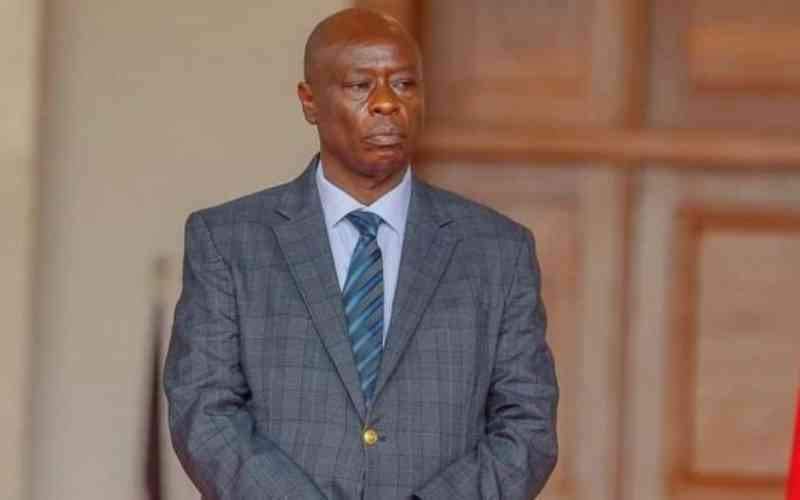15-year wait ends in freedom as court quashes murder conviction over trial flaw

Erick Ochieng Abang, a man convicted of murder and sentenced to death in 2016, has been set free after the Court of Appeal in Kisumu ruled that his trial was fatally flawed.
After nearly 15 years in custody, Abang walked free on May 30, 2025, when a three-judge bench quashed both his conviction and sentence, citing a breach of his legal rights under section 200(3) of the Criminal Procedure Code.
The bench, comprising Justices Hellen Amollo Omondi, Luka Kimaru and Weldon Korir, declared the High Court trial a nullity.
This, the court said, was because the presiding judge had failed to inform the accused of his right to have previous witnesses recalled after the case was taken over from a different judge.
Abang’s ordeal began on May 6, 2010, when he was accused of murdering Johannes Odawo Okwany, a herdsman, in Agoro West, Nyakach District, Nyanza.
The High Court trial commenced under Justice Ali Aroni (as she then was), who recorded the testimony of eight witnesses before Justice H K Chemitei took over on 26 February 2013.
Crucially, the succeeding judge did not inform the accused of his right to demand a fresh hearing of earlier witnesses.
What the witnesses said
During the trial, the prosecution called ten witnesses.
Among them was Lazarus Omollo, Okwany’s employer and neighbour to Abang.
He testified that on May 4, 2010, he found Okwany with injuries, who told him that Abang had assaulted him for grazing cattle on the land belonging to the latter’s grandmother.
Omollo noted the deceased was injured, and after the family failed to act, attempted to take him to hospital on a wheelbarrow. Okwany died en route.
Another neighbour, who is also the Abany’s uncle, testified that he witnessed the accused whipping the deceased for several minutes before he intervened.
Another witness testified that the deceased limped into his compound, holding his stomach and complaining of pain.
“He told me Ochieng had beaten him because a cow had wandered into someone’s land,” he recalled.
A post-mortem conducted at Jaramogi Oginga Odinga Hospital revealed the deceased had no visible external injuries but suffered internal trauma, including a fractured lung lining and a haematoma on the head.
The cause of death was determined to be head injury secondary to assault.
The police arrested Abang on May 7, 2010, in Nandi Hills, where he was reportedly hiding, and handed him over to officers from Katito Police Patrol Base.
In his defence, Abang denied knowledge of the incident and said he was arrested without explanation.
Legal arguments and court’s observations
The appeal was heard on February 3, 2025. Abany’s counsel argued that the trial was invalid due to non-compliance with section 200(3) of the Criminal Procedure Code.
Section 200(3) of the Criminal Procedure Code (CPC) is a provision requiring a judge taking over a partly-heard matter to inform the accused of the right to have witnesses recalled.
She also challenged the court's reliance on a dying declaration without corroboration, citing a previous case for the principle that such evidence must be treated with caution.
“The record clearly shows the succeeding judge did not inform the accused of his right to recall witnesses. That renders the entire trial a nullity,” the counsel submitted.
She further urged the court to set aside the death sentence, relying on the Supreme Court’s ruling in Francis Karioko Muruatetu & Another v Republic [2017].
In the Muruatetu case, the judges declared that, “The mandatory nature of the death sentence under Section 204 of the Penal Code deprives the courts of their legitimate jurisdiction to exercise discretion not to impose the death sentence in appropriate cases.”
In response, Senior Principal Prosecution Counsel Patrick Okango maintained that the evidence against Abang’ was solid.
“We had a direct eyewitness, and the deceased made consistent statements before his death. There was no contradiction,” he argued.
While conceding that the death penalty should be substituted with a prison term, he defended the trial process, asserting that section 200(3) gave discretion to the judge
But the appellate court rejected this argument.
“Section 200(3) provides in peremptory terms that the succeeding judge must inform the accused of his right. That duty was not fulfilled,” the bench ruled, citing a series of precedents affirming the mandatory nature of the provision.
Why retrial was denied
Although the court found the evidence potentially sufficient for a retrial, it declined to order one.
"The appellant has been in custody for nearly 15 years. He is a first offender. A retrial would serve no broader interest of justice,” the judgment stated.
“Even though the potentially admissible evidence on record is likely to return a conviction, we are of the view that an order of retrial will cause injustice to the appellant,” the court added.
Verdict
The court quashed the conviction, set aside the death sentence, and ordered Abang’s immediate release unless lawfully held for another offence.
“We take note that the appellant (Abang) was a first offender and that the prevailing jurisprudence in this Court on sentence for the offence of murder is that the appellant is likely to get a term sentence,” the court ruled.
“The term sentence may likely be the one that the appellant has already served. In the circumstances of this case, we therefore find an order to retry the appellant to be inappropriate and would not serve the broader interest of justice.”
The judgment added, “In the result, we allow this appeal. We quash the conviction of the appellant and set aside the sentence of death imposed on him. Consequently, the appellant shall be set at liberty unless he is otherwise lawfully held.”












